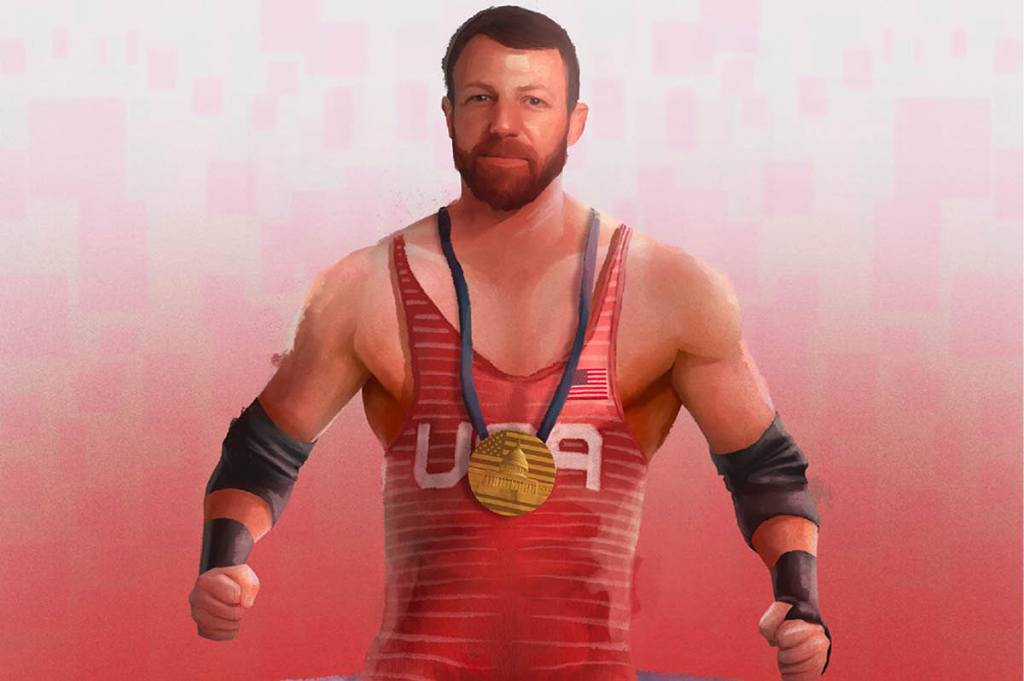Stilwell, Oklahoma
Out of the ancient belly of the earth and through the pitch-black night, the giant wigwam rises, gold-tinged and glorious, the glint of rare winnings and the sound of 2,000-plus slot machines rolling toward despair rollicking through the dark in east Oklahoma. Inside, the electric-fused honkytonk band blares Del Shannon’s “Runaway” — “And I wonder, I wa- wa- wa- wa- wonder” — from a starlight backlit stage above the sea of penny slots, the bald lead singer strumming a skull-festooned full bass as he sweats through his camo shirt. Outside, there is a distinct noise coming from beneath a neon-yellow Maserati where a timber rattlesnake has found a warm asphalt home.
This is Friday night — and that means wallets are flush and people are happy, until they lose enough that they are not happy, but rationalize it by deciding they have been cheated. The main floor is packed, the poker room lightly filled — you can’t smoke in there. The Lakers game on in the background is more appealing than the cards; there is a heated argument when the dealer with the black manicure accidentally flips before a call. “You should’ve been here last week,” the bartender says, “we had Foghat.”
I am here to interview the most mercurial and unknown member of the Senate, a man named Markwayne Mullin. The rumor on the Hill is that he has that name because his mother forgot to put a space between his first names. I came here to find the answer, and to talk to the Cherokee-nation man notorious for how quickly he flees Washington, DC, to come back home to this place, the poorest and most desolate part of Oklahoma, where he grew up, lived in a shack without water or power, raised horses, wrestled men larger than him to the floor until they yelled that they gave, and ran for office out of a deep sense of revenge against the American left.
The veins on Mullin’s arms are the first thing you notice. He’s not built like a senator, he’s built like a man who could leap off the top rope and drive you into the mat. He is a member of the Cherokee Nation, the first Native American in the Senate since the retirement of Colorado’s Ben Nighthorse Campbell in 2005. Ripped, bearded, with a belt buckle the size of a hubcap and a Stetson worn as if he’s had it on since the womb, he looks like Rip Wheeler from Yellowstone’s more ab-focused brother.
When we meet in his office in a giant barn, he is embarrassed by the presence of a ring light — he has to do Newsmax hits from here. Less embarrassing: the giant metal signs from gas stations that decorate the barn. A green dinosaur from Sinclair Oil greets you in the front yard. Inside, the Mullins have built a vintage theater with ice cream, sundries and plush chairs, where the wrestling buddies of his son are currently sleeping late into the morning, as teenage boys do. Mullin rouses them from their slumber. “Get some clothes on and shave,” he says. “Yes sir,” they say, and they will. The original poster for True Grit on the wall says they will.
Mullin’s eldest biological son is at his hip, matching him stride for stride as they prep their horses for the seventy-sixth annual Stilwell, Oklahoma Strawberry Festival and its parade — “It’ll be epic.” This is Jim, the son who had a wrestling accident in 2020 — hit wrong in the head, he wavered, dropped and coded, and almost died. They said he wouldn’t live or walk or wrestle again — so Markwayne took his eldest out to California for a year to a neurological treatment center to teach him to do all these things because this is America and here we do not give up, ever. And so Mullin went out to the west coast and his son learned to do these things, and after bouncing back from a bad ATV accident when he came home, decided he could wrestle again, too. Beating a litany of foes after a year away from wrestling earned him a scholarship to Oklahoma.
Jim has an older brother now, Jayce, adopted after his father died of brain cancer. He’s headed to Oklahoma State to wrestle as well, after winning the state title in 2022. The Mullins are into adoption — they brought twin blonde girls into their family in 2013. They appear at the horse stalls in the garb of the day: matching pink T-shirts with bright spangled strawberries on them. They wear their hair in different styles to help adults tell them apart, and they are accompanied by their older sister and Mullin’s wife, Christie, who immediately radiates a velvet-gloved command of the family and all that it touches. Let not her turquoise jewelry deceive — it was an immediate mistake by this writer to use the “F” word around her, however appropriate the target (in this case, the city of New York).
We pack into large bright red trucks and head to Stilwell, the county seat, population 3,700. It is poor. Let us for the first and last time reference Wikipedia: “Today, residents of Stilwell are among the poorest and most impoverished in the United States.” This is an understatement. The buildings are blown out and fire burnt, the rare patch of clipped green sod clearly a recent addition. Yet the Mullins have built a restaurant that looks clean and new and beautiful in that particular Pottery Barn way. It smells of powdered sugar, and is known for pies and sheet cakes and baked goods that people order in massive batches. It is a creation of Christie, and Markwayne funds it to give people jobs. “We have not and will never see a dime from this, and that’s OK,” he says, and smiles.
The horses are unloaded and blankets and saddles prepped. Mullin and his son, in an old red-and-white-striped rodeo shirt of his father’s, will be riding high — though Mullin thinks he might lose his cell phone. “I hope I do,” he says as they head out. It is of his nature to feel this way. “What’s your favorite thing about Washington?” I ask as my first question, not knowing the man yet. His eyes are wide open and firm: “Leaving,” he says. “I don’t talk to other people, but we don’t talk. We don’t trust each other at all. I can count on one hand the number of Democrats I’ve talked to in the Senate. No one cares. So I get back here, because these are the people I care about.”
If you do manage to get Mullin talking, he has a lot to say. He’s fed up with Washington and its ways. He thinks both parties are shot through with corruption and bias and he wants off-the-wall people to solve problems. He has tons of friends in the House, where he spent a decade before moving to the Senate at the last election. Among them is Kevin McCarthy, who he feels particularly indebted to because of the personal help McCarthy offered when Mullin and his son were in California. His teetotaling rubbed some members the wrong way — Paul Ryan couldn’t believe he asked for sparkling water when they met for a beer on the Speaker’s porch in the Capitol — but it’s founded in a drunken episode where a hammered, hungover Mullin had to haul sheetrock in the Oklahoma heat through a marathon of vomiting. He never touched the stuff again, and his wife keeps him on that straight and narrow — which is also probably why he’s built like a Hemsworth.
The Stilwell Strawberry Festival is a sight. The beating sun does not deflect people from the warring food trucks, where “the best funnel cake in the state,” drenched in strawberries and powdered sugar, is advertised alongside “Chicken on a Stick.” A competitor promises “Giant Chicken on a Stick.” A large tent advertises various sizes and shapes of knives for sale; there’s a poster in the back of Donald Trump as Rambo — “No man, no woman, no Commie can stop Trump.” The parade consists overwhelmingly of two things: giant bright-colored pickup trucks where a young girl in a sparkly glitter-shined gown sits on a blanket on the hood and waves to the crowd, her sash for “Best Smile” or “Brightest Eyes” wrapped around her as her proud high-BMI father drives lazily and smiles; and candidates for the Cherokee Nation district office, which include a plethora of names combining the best of west and east. One candidate, Wes Nofire, has a flatbed truck with a full band backing an electric guitarist playing Johnny Cash, while dressed in a full Bigfoot costume. Nofire hosts symposiums that bring a lot of tourists, the nice white-haired lady behind the local GOP table, which stocks brochures and the latest copy of Hillsdale’s Imprimis newsletter, tells me. There is no Democrat table.
I ask Mullin about that. He says: “No, no, Bigfoot isn’t real. Sasquatch is real.” My rookie mistake. He embarks on a discourse on the network of caves running through the territory, across Cherokee land and through to the creeks and passes of the Ozarks, where Sasquatch is said to roam — and where the tales say Confederate gold is still hidden, awaiting the rise of the ghosts of the Old South to make wrong the rights of yore.
Besides the politics, the parade is notable for its constant reminders of faith. One church after another advertises their Vacation Bible School summer sessions for children of all ages. One particularly blunt congregation distributes bright blue and orange neon pamphlets which advertise: “How to Get to Heaven.” They offer free prayers from the back of the pickup trailer, to a community that seems greatly in need of them, and not too shy to ask.
The horses come last, I’m told. And they do, after two hours — with star-spangled riders and darling teenage girls standing high in the stirrups. This is a star turn for these girls and they have their friends on the sides of the parade route, TikTokking and Instagramming their perfect makeup and white cowboy hats and fashionable boots on well-brushed horses who carry on their backs the many beauties of a nation, proud and free. Mullin rides among them, denim-clad and straight-backed, nary a sign of a lick of sweat on a ninety-eight-degree day. The announcers at the center of town acknowledge him and he tips his hat, but barely. He’s just a US senator — don’t think you’re too big for Stilwell.
Mullin is a political anomaly in many ways. All he wanted to be was a husband and a father who made enough money to put roofs over the heads of his family, immediate and extended. His entry into the fray was driven by personal experience. He dropped out of college to take over his father’s plumbing company in 2011, quickly turning it into a profitable entity employing hundreds of people. But then the Obama administration came calling, and in Mullin’s telling, they had no interest in finding compromise — they just shut one of his businesses down thanks to regulatory decisions he viewed as baseless and arbitrary. So he decided to run for office and, surprisingly, won.
In the House, he bonded with everyone — who doesn’t love the idea of having a mighty barbarian as a friend? — but particularly the outsiders. He counts former Democratic congresswoman Tulsi Gabbard as one of his closest friends, and is lobbying aggressively for Donald Trump, should he win the GOP nomination, to choose her as his running mate. “She’s a combat veteran, she’s off the wall, she’s daring, and she’s principled,” he tells me. What about concerns that the neoconservatives and the left will say she’s a pawn of Russia for her dovish views? Mullin smirks midbite into a strawberry pastry — the man eats like it’s fuel, because it is — and responds: “How many votes do they have? No one cares. That’s Washington talk.”
Mullin, in his shirtsleeves and beard, stands out in images from the House floor on January 6, where he came closest among all the lawmakers to exchanging actual blows with the rioters.
In the Senate, where he replaced the institution that was Jim Inhofe, the gravelly voiced conservative who looked like a character actor from a Clint Eastwood western and drove environmentalists red-eyed mad, Mullin has become famous for viral moments in committee hearings. His denunciation of the head of the Teamsters was brutal, like something out of a Scorsese movie, with the two men going quickly from challenging perspectives to challenging each other to take it outside. The bloated, bald Teamster looked like a joke in the moment, mocking Mullin as a “tough guy” — well yes, he is, he roped horses in rodeos and rode bucking broncos and won MMA matches and has been in more fights than he cares to recount. But when the video started racking up views, Mullin didn’t lean into it — he asked his staff to post a single tweet clarifying that he’s not anti-union, he just hates the people who suck money out of workers to no good end. He is used to speaking in muscle and wrestling grips and the punishment of a hardscrabble life where there are lean horses too wild to break. What are tweets, even, to this life?
It is a part of this cowboy senator’s appeal. The old-fashioned strong and silent type finds today’s social-media-dominated political fray completely absurd. You go to Washington, you do the work, you fight the right fights, and you go home to take care of family and town and the place you are from. Because these are the things that matter. As we are talking, an elderly woman comes up to give him a hug. She is his math teacher from middle school. Was he a good kid? “Oh no,” she says, and they laugh.
Mullin is a Trump supporter. He thinks Ron DeSantis should not have run this cycle — he likes him, but thinks Trump’s charisma is unique and impossible to overcome, and DeSantis has none of it. He’d like him to run in 2028. For Senate leader, of the three Johns contending to replace Mitch McConnell, Mullin thinks Thune of South Dakota has the lead, but acknowledges that Texas’s Cornyn is lobbying hard. As for the general state of the Republican coalition: he’s a diehard social conservative who recognizes the limits of that appeal. “We need more moderates, more caring voices on this,” he says, before noting all the different single mothers he knows, employs, and in some cases supports. This is not the part of the country where one feels obligated to marry the mother of his children, but it used to be, and it could be again.
At the rodeo that evening, a packed event where the entire town turns out, the roping and riding is interspersed with awards and sashes and free gift cards. Mullin sits in the center of the metal stands in blue jeans smattered with dirt, and quietly points out people in the crowd. This one, he tells me, we’ve got her in this job, her baby’s father is in jail. This one, we think he’s dying of cancer but he can’t pay for it, so we’re figuring it out. This one, she’s never met half her relatives, can you imagine? The litany is a reminder that family breakups and household disintegration are in no way confined to the inner cities of America. “Did you want food?” he asks. “It’s really good here.” He has said this everywhere we’ve gone, as if the tastes of home are magically infused with some form of local power. In Washington, he slept in his office throughout his House days, and now that he’s in the Senate, he typically eats Spam for dinner. “It’s easy — just fry it up in a pan.”
The debates over the future of the Republican Party are tiresome to Mullin. After the wrecking ball of Trump, he sees a coalition that will end up more populist but more expansive, with more appeal to the people at the rodeo, where the blue clouds are drifting close to the darkness. How many people here are on Medicaid? “Almost everyone, or Medicare,” he says, “and the kids on SoonerCare, and food stamps.” The top employers in the county are chicken and marijuana farms. And foreign threats are here, too — Mullin describes the presence of Mexican and Chinese criminal entities, who have bought land and started raising violent crime rates in the area. He can’t get the FBI to come in, he claims, because the state government’s endorsement of legal pot makes it impossible to adjudicate between the criminal and the legal grower. “Legalizers didn’t realize what would happen after,” he says, “they didn’t think about why the black market wouldn’t go away.”
In front of us, a Mullin cousin is dealing with a pink-strawberry-clad toddler who has dumped Dr. Pepper and then nacho cheese down her blouse. Before I leave, I have to ask about the name, so I do. Mullin smiles. He has two uncles, he says, Mark and Wayne, and they couldn’t decide whose name would come first — he pulls out his phone, which he keeps unsubtly trying to lose, to show me a picture of them — and after his mom put both names on the birth certificate, she meant to go back and pick one over the other, but never did. “I hated that,” he says, “because I was in trouble so often as a kid in school, everyone knew when my name was on the loudspeaker. And that made me make more trouble. I swear if I hadn’t married Christie, I’d be in prison. We’ve gotta make sure more people don’t face that. That means jobs. That means making sure chickens and marijuana aren’t the big employers here.”
In the Senate, there are men who try to push the buttons of the national media. They wake up every day trying to get on primetime television. They think about things in terms of what will go viral. They analyze each situation in terms of what will give the best hype, the best promotional material for their ideas. Here in Markwayne Mullin’s town in eastward Oklahoma, the Indian Country that Charles Portis wrote of, that Cormac McCarthy studied, that has been in its time devastated by drugs of local and foreign origin and all along sought nothing but pride and a place to stand up, such things are ephemeral and pointless. The point is to do the thing, to go, to argue, to fight, to take a stand, and then to come back home to the wife and family that you love and the people you care for, and live with them in utter normalcy, undisturbed by the vacuous place you must inhabit three days out of the week.
It is Saturday night at the Casino. The arms are pulled and buttons pushed and a blonde woman not too heavy to be appealing in the flickering lights is leaping joyously over her performance at the roulette table. The band is new and dressed in black, blaring Elvis’s “Devil in Disguise” above the massive crowd. A skinny black man in a shirt three sizes too big wins $300 at an old slot machine, then leans the chair against the machine to ensure no one takes it. The cigarette smoke hits the nostrils hot. The Maserati is gone, but there is a dark black Mercedes in its place, near where a man in a white T-shirt and an LA Dodgers cap is entering. A good night? A bad night, he says. Well, I say, “The devil’s own day — lick ’em tomorrow though.” He laughs as he lights a Marlboro. “That’s the American way, I tell ya.”
This article is taken from The Spectator’s July 2023 World edition.


















